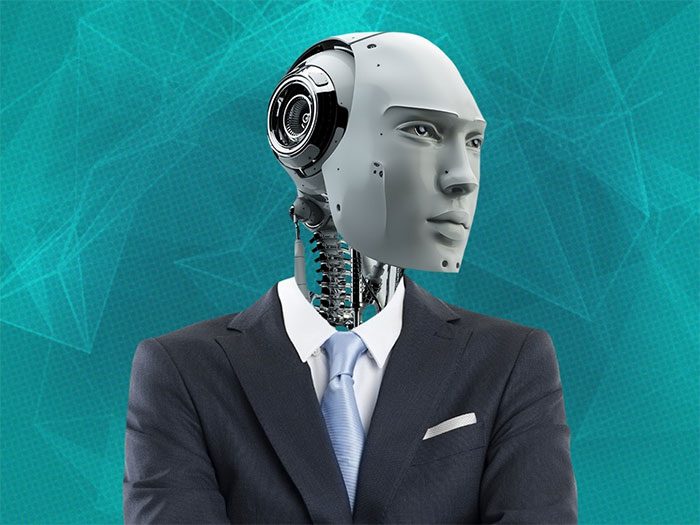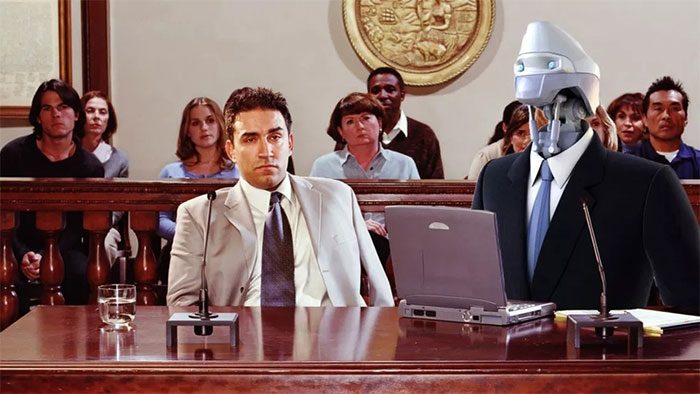Developer RobotLawyer Aims to Replace Lawyers with AI, Reducing Litigation Costs for Clients
In recent years, the capabilities of artificial intelligence (AI) have expanded more than ever, from writing poetry and programming to crafting essays. Even text-to-image generation tools like DALL-E 2 and Stable Diffusion can create artistic works, impressing even seasoned professionals in the industry.
Recently, AI has once again demonstrated its limitless potential through practical applications in daily life.

This is the first case using AI, so the AI company will be liable if they lose the lawsuit. (Photo: Business Insider).
World’s First AI Lawyer
A computer program integrated with AI called RobotLawyer is set to be used in a US courtroom as a defense attorney for a client in February 2023. The lawsuit revolves around a speeding ticket.
In fact, this program will not appear in court; instead, it will be installed on a phone and advocate for the defendant through a headset.

RobotLawyer will provide advice and defend the client through a headset. (Photo: TechSpot).
RobotLawyer is developed by the AI company DoNotPay. Founded in 2015, DoNotPay specializes in providing chatbot services that help individuals dispute and negotiate with large organizations regarding financial discrepancies, annoying automated calls, or even contest parking tickets received by customers.
DoNotPay claims that they often win most of these cases but still choose to hire consulting firms due to lack of funds for expensive legal teams or insufficient time for complex disputes.
Recently, DoNotPay successfully developed an AI program to advocate in straightforward cases like these, saving clients’ time.
For example, if someone wants to cancel a subscription service, they can use the AI program to negotiate with the provider. This tool can also propose reasonable solutions when the response is an automated message.
By 2023, the AI company made another significant advancement by participating in the defense of a client penalized for speeding. DoNotPay asserts it is the first company to have a robot lawyer. RobotLawyer will compile all relevant data from past lawsuits to prepare for the case and respond to the prosecutor in court.
Aiming to Replace Lawyers
According to Interesting Engineering, since this is the first case using AI, DoNotPay will bear full responsibility if this AI program loses the case. DoNotPay will be liable for the speeding fine. However, if they win, the company’s AI tool will pave the way for further implementation of artificial intelligence in the legal field.
Yet, the biggest question is whether using AI in court violates any laws. On this matter, DoNotPay’s CEO Joshua Browder mentioned that there was a previous case where the defendant was allowed to hear the defense through headphones, indicating that this practice complies with legal standards.

CEO Joshua Browder is a computer scientist at Stanford University. (Photo: DoNotPay).
Browder stated that he spent significant time training the AI virtual assistant to handle lawsuits from various fields.
Among the challenges, the most difficult was ensuring that the AI tool is based on facts. He asserts that AI must not distort or manipulate the truth. The AI tool is designed not to react automatically to every occurrence in court. Instead, RobotLawyer will listen to the arguments presented and analyze them thoroughly before advising the client.
Browder emphasized that his goal is for RobotLawyer to replace lawyers, ultimately helping to reduce litigation costs and the need to hire legal experts. “All that needs to be done is to use language to persuade and negotiate, yet lawyers often charge hundreds or even thousands of dollars per hour,” he remarked.
Not only providing legal advice, DoNotPay also commits to helping clients win even against large corporations and to sue anyone who infringes on their rights with just a few simple steps. RobotLawyer will first ask specific questions about the client’s issue, then identify loopholes, incorporate them into the lawsuit, and submit it to the competent authority.





















































